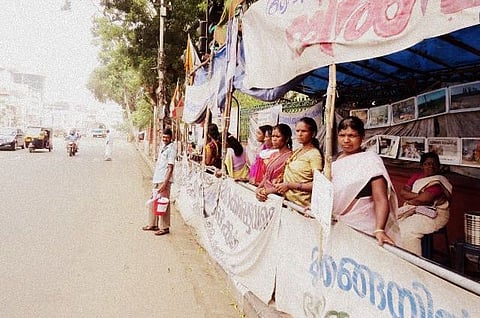

The tribals of Kerala are all set to re-launch their Nilpu Samaram in January, a year after waiting for the government to make good its assurances which included implementing the Panchayats (Extension to Scheduled Areas) PESA Act.
The well-known 162-day Nilpu Samaram (Standing Agitation) by tribals in front of the Kerala Secretariat ended in December last year after the government promised to meet their demands, which included allocation of an acre of land to each Adivasi family evicted during the 2003 Muthanga occupation and providing Rs 1 lakh as compensation to each child detained during the agitation.
Now, the Adivasi Gotra Maha Sabha (AGMS) which is spear-heading the agitation has also decided to launch a new political party – Adivasi Ooru Vikasana Munnani – (Tribal Village Development Front) by March 2015 to safeguard the interests of the tribal people, dalits, fisher-folk and other marginalized groups.
Speaking to The News Minute, AGMS president CK Janu said that talks are on at the grass-root level in order to form the party so as to redress the on-ground needs of the people it seeks to represent.
This second phase of the Nilpu Samaram will continue until the Kerala government hands over the entire 19,000 acres of land earmarked by the union government – as ordered by the Supreme Court – to landless tribals.
“Most of this land is located in the districts of Wayanad and Palakkad and the remaining across Kerala. Our people are ready to accept land anywhere in the state, but the government is yet to act upon the centre’s directive,” says Janu.
The proposed agitation in its first phase in 2014 had garnered widespread media coverage – both online and in print – with its novel means of protest, wherein around 50 tribals stood each day for 11 hours to register their protest against alleged negligence by the state government.
This tribal fight for justice has been on since 2001. Matters reached a head in 2003 when the tribals sought to occupy the Muthanga Wildlife Sanctuary in Wayanad district. One tribal man and a policeman were killed in police firing.

Pic taken last year during the Nilpu Samaram
In 2014, the tribals sought to register their protest against the government’s inaction in providing them land and basic amenities through the Nilpu Samaram. It was called off only after the government agreed to almost all their demands including implementation of PESA Act in the tribal dominated panchayats of the states.
The PESA Act of 1996 was enacted by the union government to include the “Scheduled Areas’ not covered by either the Panchayati Raj Act or the 73rd Amendment.
One of the peculiarities of the tribal population in Kerala is that there is no Scheduled Area i.e. there is no block or taluk with more than 50% tribal population. Out of the 48 tribal communities in the state, 37 have been declared Scheduled Tribes. These communities form less than 2% of the state’s population.
The Puthur Gram Panchayat in Attappady Block in Palakkad district and the Noolpuzha village in the Wayanad district however have more than 50% of tribal population. According to the Kerala Scheduled Tribe Development department, the Edamalakudy Grama Panchayat in Idukki district has now been declared as the first Scheduled Tribe Panchayat in the State.
AGMS leaders however are in no mood to settle for mere crumbs from the government. “Take for example the Aralam Farm in Kannur that was established in 1970 to supposedly improve the standard of living of the Adivasis. Elephants and not tribals reign supreme there. With alarming regularity, these elephants raid the farm, smashing anything that comes their way, with even a woman being trampled to death. For us to contribute to the farm’s success, setting up of an electric fence as well as digging of deep trenches all around the periphery is the need of the hour. Without these practical aids, trying to grow anything there is literally a fruitless endeavour,” elaborates CK Janu.
The feisty tribal leader also talked about the health hazards posed by the widespread use of pesticides on the nearby government-run pineapple farms which too would have to come to an end.
“All Adivasi areas should be declared as Scheduled Tribe Development Areas under the PESA Act if indeed they wish to implement a comprehensive development package for the tribal population,” signs off CK Janu in a prelude to the Nilpu Samaram-2 scheduled to begin in January next year.